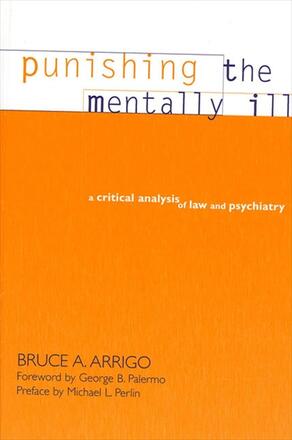
Punishing the Mentally Ill
A Critical Analysis of Law and Psychiatry
Alternative formats available from:
A provocative exploration of a wide range of controversies in mental health law, this book argues that the criminal justice system punishes citizens for being mentally ill.
Description
A powerful, sophisticated, and original critique on how the disciplines of law and psychiatry behave and on how the mental health and justice systems operate, Punishing the Mentally Ill reveals where, how, and why the identity and humanity of persons with psychiatric disorders are consciously and unconsciously denied. Author Bruce A. Arrigo contends that despite periodic and well-intentioned efforts at reform, the current law-psychiatry system functions to punish the mentally ill for being different. The book synthesizes a wide range of mainstream and critical literature in sociology, law, philosophy, history, psychology, and psychoanalysis to establish a new theory of punishment at the law-psychiatry divide. To situate the analysis, enduring psycholegal issues are explored including the meaning of mental illness, definitions and predictions of dangerousness, the ethics of advocacy, the right to community-based treatment, the logic of forensic courtroom verdicts, transcarceration, and the execution of mentally disordered offenders among others. Punishing the Mentally Ill shows that current mental disability law research, programming, and policy are seriously flawed and that wholesale reform is necessary if the goals of citizen justice, social well-being, and humanism are to be realized.
Bruce A. Arrigo is Professor and Chair of the Department of Criminal Justice and Adjunct Professor of Public Policy and Psychology at the University of North Carolina-Charlotte. He is the author of several books, including Social Justice/Criminal Justice: The Maturation of Critical Theory in Law, Crime, and Deviance and, with Christopher R. Williams, Law, Psychology, and Justice: Chaos Theory and the New (Dis)order, also published by SUNY Press.
Reviews
"The book offers key insights and is a genuine contribution to post-modern approaches. " — Metapsychology
"The author's analysis is quite illuminating. Indeed, it prompted me to think about the many encounters I have had within the system and the language and conversations I have witnessed. In many ways, I felt the analysis and central arguments provided a new, deeper way of understanding these routine events. " — Eric R. Wright, Indiana University-Purdue University Indianapolis
"This is a very thought-provoking book regardless of whether one fully agrees with its findings and conclusions. " — Donald M. Linhorst, Saint Louis University